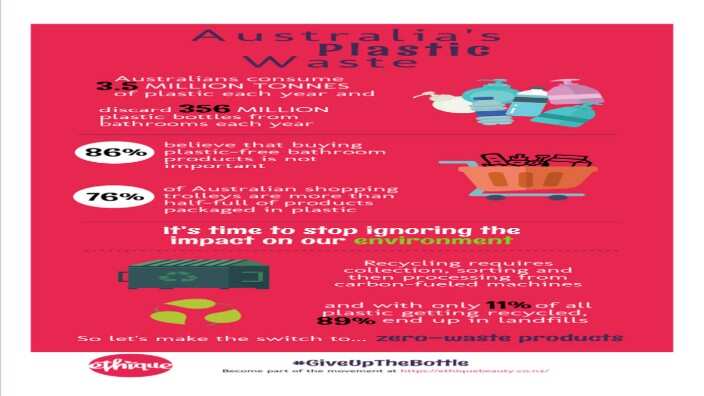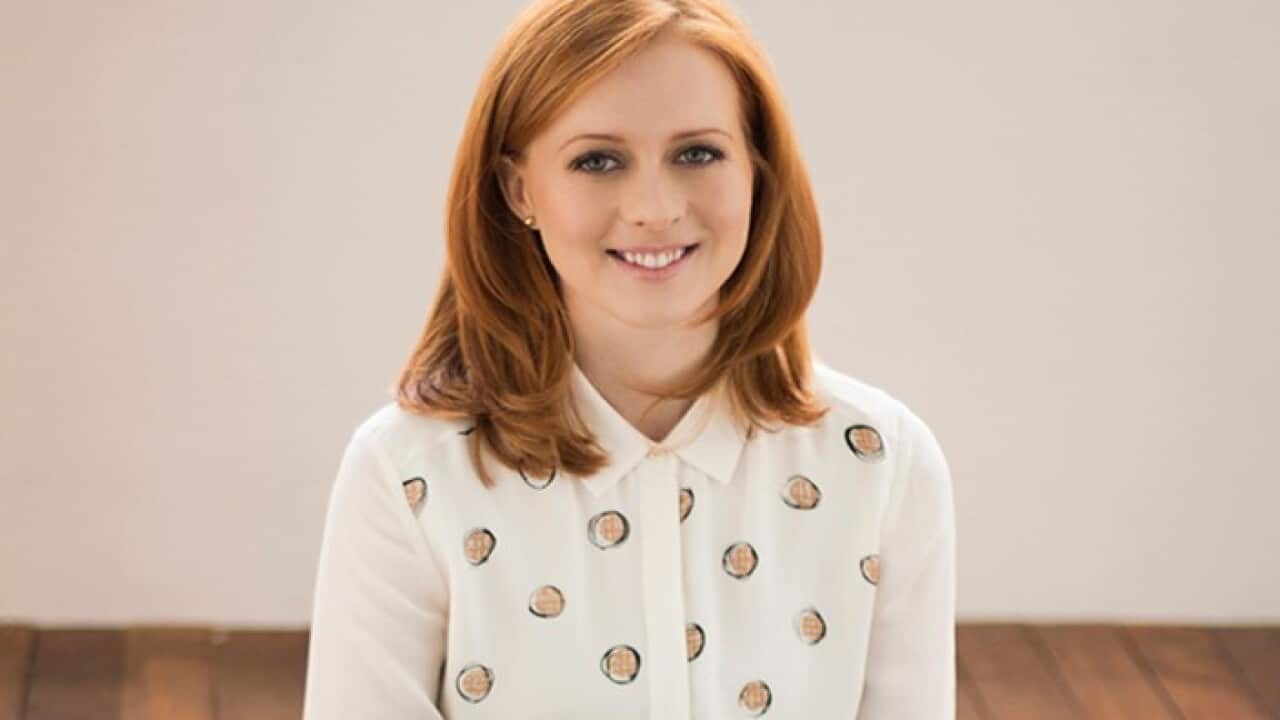How zero plastic living come into exist?
Erin Rhoads, the founder of Ethique and also the author of the Rogue Ginger said that she is trying to live a life free of plastic as much as possible, but how does she go about it?
In one of Erin Rhoad's video, she said that the "Clean Bin Project" has turned her life around.
She elaborated further that after watching this documentary and did some research about plastic and its impact on the global environment, she figured out that plastic can be traced back to our food sources that can impact us the environment and future generations.
This has ignited Rhoads to rethink, reuse, refuse, and starting to compost foods scraps and trying to avoid plastic packaging as much as possible, by buying bathroom accessories in plain packages especially when it comes to shampoo, conditioners or lotions, it has to be a solid form-a bar, not in plastic packaging or plastic bottles in order to reduce plastic bottles use in our bathrooms.
Rhoads chooses to use a refillable water bottle, reusable coffee cup, loose vegetable instead of the ones in plastic packaging. She uses glassware for storage and brings her own cloth bags when shopping. The idea is to minimize as much waste as she can. And her last resort is to recycle.

Impact of plastic in the past, present and future
Latest report in Australia claims, by the end of 2019 or early 2020 Hobart will be the first Australian city to ban all kind of single use plastic according to SBS News. However, recent Australian supermarket single use plastic bag ban has stopped some of 1.5 billion plastic bag or 80% of plastic bag ending up in the environment and they believe it is just the beginning. But the most alarming issue is that scientists has predicted that by 2050, there will be more plastic the fish in the ocean.
It is reported that each year the world has produce 300 million tonnes and 12 million tonnes end up in the world oceans. The most common items are cotton buds, plastic utensils, plastic bag and fishing net.
According to SBS Insights' story: Life without plastic is possible but it's hard, it states that "there are 5 countries in Asia ( China, Indonesia, Philippines, Vietnam and Thailand) who dump plastic into the ocean more than those combine from the rest of the world, if there is any hope stopping plastic pollution, plastic dumping in Southeast Asia must be dealt with first, otherwise, all efforts are just a drop in the ocean."
December 2017, over 190 countries have agreed with the United Nations' plans to stop plastic ending up in the global ocean.
But the good news is that currently there are many new environmentally friendly initiatives that could change or replace the use of plastic such as food wrap that are made from corn starch, or sugar can, cassava plastic that wrap food but we can eat or plates made from big tree leafs in Thailand to name a few. Environmental friendly food containers and or utensil made from paper, bamboo and timber has propped up. Therefore though plastic might still affect some businesses and some of us as consumers, new business initiatives opportunities and life without plastic are also here to stay.
Cleaning up the world ocean
Boyan Slat, a young dutch man has came up with ideas to clean up plastic from the global ocean. Mr. Slat believes that we must do it though some scientists still doubt it. They claimed we may clean those floating plastic on top of the ocean, however, we may not be ale to clean those that are sinking to the bottom of the sea, and to some, they see this process as a disturbance to the marine life. On top of that million tons new plastic are going to add up into ocean. Though scientists said that we should target those root causes from land in the first place.
Old habits die hard but can we change people's mindset? Erin Explained.
"Rwanda (2008) and Kenya are two of many countries who are really leading the way in terms of creating legislation where people are fine if they use any type of single used plastic bag or any plastic bag. There are a lot of education as well, and I think education is key and having the laws in place is great, but we need to provide that education to help people understand why do we make the change, how to create new habit, and to remind them that you can live a very fun and fulfilling life without all these plastic, because our great grandparents survive and thrive without all of these single use plastics very well and we can go back to that easily,'' said Erin Rhoads.
But does Australian society pay much attention to this environmental issue?
Rhoads said that ''we start to see a lot of people paying more attention toward environmental issue after war on waste in the past two years which is fantastic and there are a lot more article written about this issue. But she said that should be a lot more education like raising awareness about this issue is important and needed in Australia''.
"I think people don't realise the detrimental impact of these plastic which will sit around for over 400 years old before it starts to decompose. In the mean time, it can get out to environment. I as a mom I just get worry about what kind of world we are going to live in the next generation, they are going to be left to clean our mess."
What is the reaction toward Erin Rhoad's zero waste lifestyle?
Rhoads said that "there are a lot of excitement since we have pushed to reduce and reuse. The EU has a lot investment into zero waste industries, if we could do some more of that in Australia," it would be great she adds.
''Erin believes that there is not enough education in Australia and this idea of zero waste will make Australians feel deprive if they have to choose the environment over something else, but now that we see the Ethique in the mainstream store, we can see that there is an alternative choice out there. But in reality we need the environment to survive and and to live a healthy life, if we don't have a healthy earth then we won't be healthy either."
Rhoads believes that every stakeholders should work together not just relying on consumers to make changes, government needs to fun these business, and learn from other countries.
"We have so much plastic waiting to be recycled but because of the potential risk of creating a fire, therefore, they end up in landfill.''
''We have too much plastic in the world so we need to turn off the tap, we cannot just recycle our way out of this issue. We need to reduce the amount of the plastic we are producing and using.''
Rhoads said that "some of the EU countries who turn waste into energy they are fantastic recyclers, they can separate their recycle effectively but in Australia we mix all our recycle materials into one bin.''
They have learnt the value of materials but it is not the case in Australia Erin believes, therefore we will produce more or those things to burn whereas the EU don't have enough rubbish and so they have to buy rubbish from other EU nation to turn into clean energy. But if Australia keeps consuming and producing things we will have to keep mining resources and that could have huge impact on the environment and communities and I think that we shouldn't go down that way because there are other alternatives.
Fine the polluters
Some would argue that we as consumers are at the end game and why should we punish while big business roam free. Anyways, we as consumers have a choice to make that is environmentally friendly products, environmental ethical investment and first make changes from ourselves then demand changes to business practices. Government also needs to jump in with new environmental initiatives investment and legislations to help business changes more sustainable products and environmental friendly products.
Erin Rhoads said that she like the ideas in Switzerland where people pay accordingly to the amount of rubbish they create. She also suggested that we should supports local businesses as they will create less waste and don't have to ship the products long way off to us. Talk to them and ask them to make changes or walk away from businesses that don't pay attention to environmental issues.
Another point is that Rhoads wants Australians to raise their environmental issues with their local Member of Parliament as we select them to represent us to represent our views and we want them to do this for us as next federal election is approaching in.
Her message to Australian is that we should learn to stop and think about the environment before we buy anything, reuse, recycle or go second hand items, start composting if we haven't done so and contacting businesses and our MPs and keep reminding them that we want this investment.
Further reading:
1) Plastic free life https://myplasticfreelife.com/plasticfreeguide/
2) The Rogue Ginder https://www.therogueginger.com
3) The Clean Bin Project https://cleanbinproject.com
4) Life without plastic is possible, it's just very hard https://www.sbs.com.au/news/insight/life-without-plastic-is-possible-it-s-just-very-hard
5) Supermarkets ban single use plastic bag nation wide https://www.sbs.com.au/news/australia-wide-ban-leads-to-80-per-cent-drop-in-plastic-bag-consumption
Listen to us at SBSHmong or SBS Hmong Facebook page or download podcasts.





